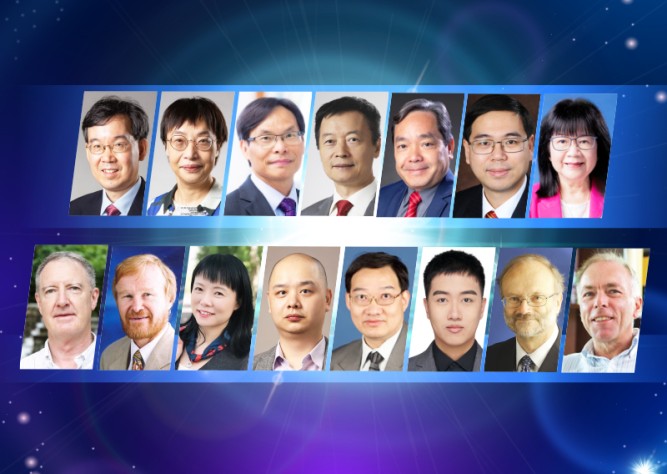Lingnan scholars listed as World’s Top 2% Scientists according to Stanford

Fifteen Lingnan University scholars are among the World’s Top 2% Scientists published in 2023 by Stanford University in the US.
(Pictured, top row from left) Prof Li Lianjiang, Prof Pun Ngai, Prof Sam Kwong Tak-wu, President S. Joe Qin, Vice-President Joshua Mok Ka-ho, Prof Chen Xi, and Prof Siu Oi-ling
(Pictured, bottom row from left) Prof David Phillips, Prof Dean Tjosvold, Prof Lucy Yu Baohua, Prof Xie Haoran, Prof Wong Man-leung, Prof Tang Xiaopeng, Prof Michael Firth, and Prof Ray Forrest
The Lingnan strength on the list has been boosted by new members of the University, who are Prof S. Joe Qin, President and Wai Kee Kau Chair Professor of Data Science; Prof Sam Kwong Tak-wu, Associate Vice-President (Strategic Research) and Chair Professor of Computational Intelligence; Prof Chen Xi, Dean and Chair Professor of the School of Interdisciplinary Studies; Prof Lucy Yu Baohua, Associate Professor of the School of Graduate Studies; and Prof Tang Xiaopeng, Assistant professor of the Science Unit.
Most of the Lingnan scholars in the Top 2% have been listed for more than a year, including a larger portion of the new ones and Prof Joshua Mok Ka-ho, Vice-President, Lam Man Tsan Chair Professor of Comparative Policy, and Dean of the School of Graduate Studies; Prof Pun Ngai, Chair Professor and Head of the Department of Cultural Studies; Prof Siu Oi-ling, Lam Woo & Co Ltd Chair Professor of Applied Psychology and Head of the Department of Psychology; Prof Li Lianjiang, Professor and Head of the Department of Government and International Affairs; Prof Xie Haoran, Associate Professor and Head of Department of Computing and Decision Sciences; and Prof Wong Man-leung, Professor of the Department of Computing and Decision Sciences.
Also on the list are Prof Dean Tjosvold, Emeritus Professor of the Department of Management, Prof David Phillips, Emeritus Professor of the Department of Sociology and Social Policy, and the late Prof Michael Firth and Prof Ray Forrest, formerly in the Department of Finance and Insurance and the Department of Sociology and Social Policy respectively.
The diverse research background of some of them includes:
- President S. Joe Qin, a Fellow of the U.S. National Academy of Inventors, a Fellow of the International Federation of Automatic Control (IFAC), an AIChE Fellow, and an IEEE Fellow; also the recipient of the 2022 CAST Computing in Chemical Engineering Award by the American Institute of Chemical Engineers (AIChE) and the 2022 IEEE CSS Transition to Practice Award — to date he is the first and only recipient of both awards from Greater China
- Prof Sam Kwong Tak-wu, a distinguished scholar in evolutionary computation, artificial intelligence (AI) solutions, and image/ video processing, with a strong record of scientific innovations and real-world impacts; also an IEEE Fellow in 2014, and a Fellow of the Asia-Pacific Artificial Intelligence Association (AAIA) in 2022
- Prof Chen Xi, a distinguished scholar in engineering science and sustainability, who addresses real-world challenges in energy, environment, nanotechnology and biology; also a Fellow of the American Society of Mechanical Engineers (ASME) in 2014
- Prof Lucy Yu Baohua, who specialises in motivation in education, experiential learning, cross-cultural communication, cultural adaptation and identity, and innovative teaching
- Prof Tang Xiaopeng, whose research and teaching interests are in modelling and control of energy storage systems
- Prof David Phillips, who researches widely on global health, social gerontology, social epidemiology, and age-friendly cities and communities
This recognition acknowledges the research and academic strengths of Lingnan scholars, and the impact that each of them has made on both academia and society. Please visit HERE to learn more about other listed Lingnan scholars.
Stanford’s extensive database adopts a composite indicator based on standardised citation metrics, which include the number of citations, the h-index (measuring scientific research output), and the co-authorship.

